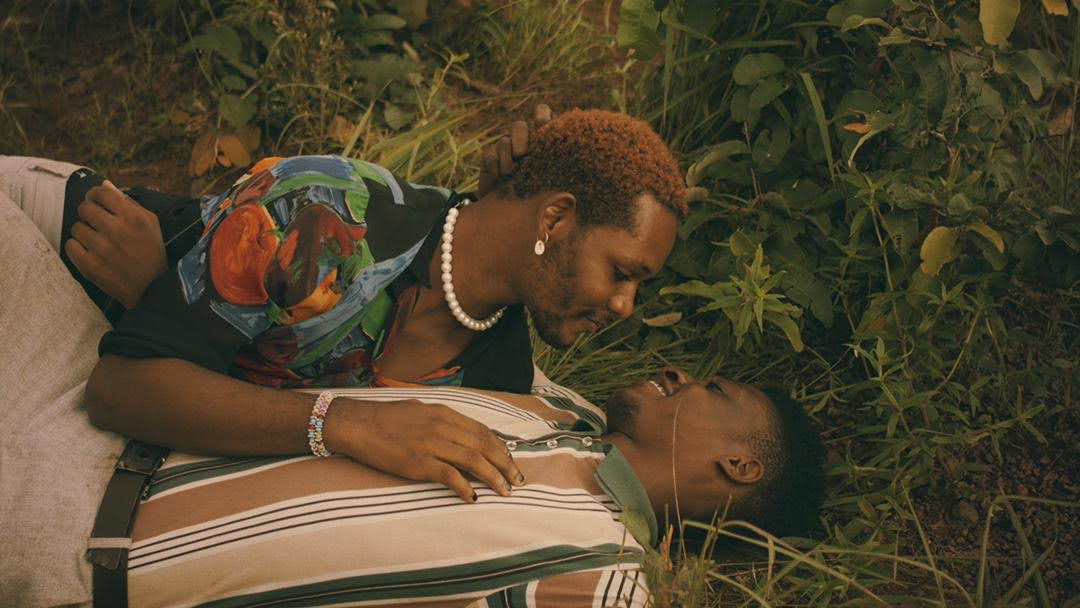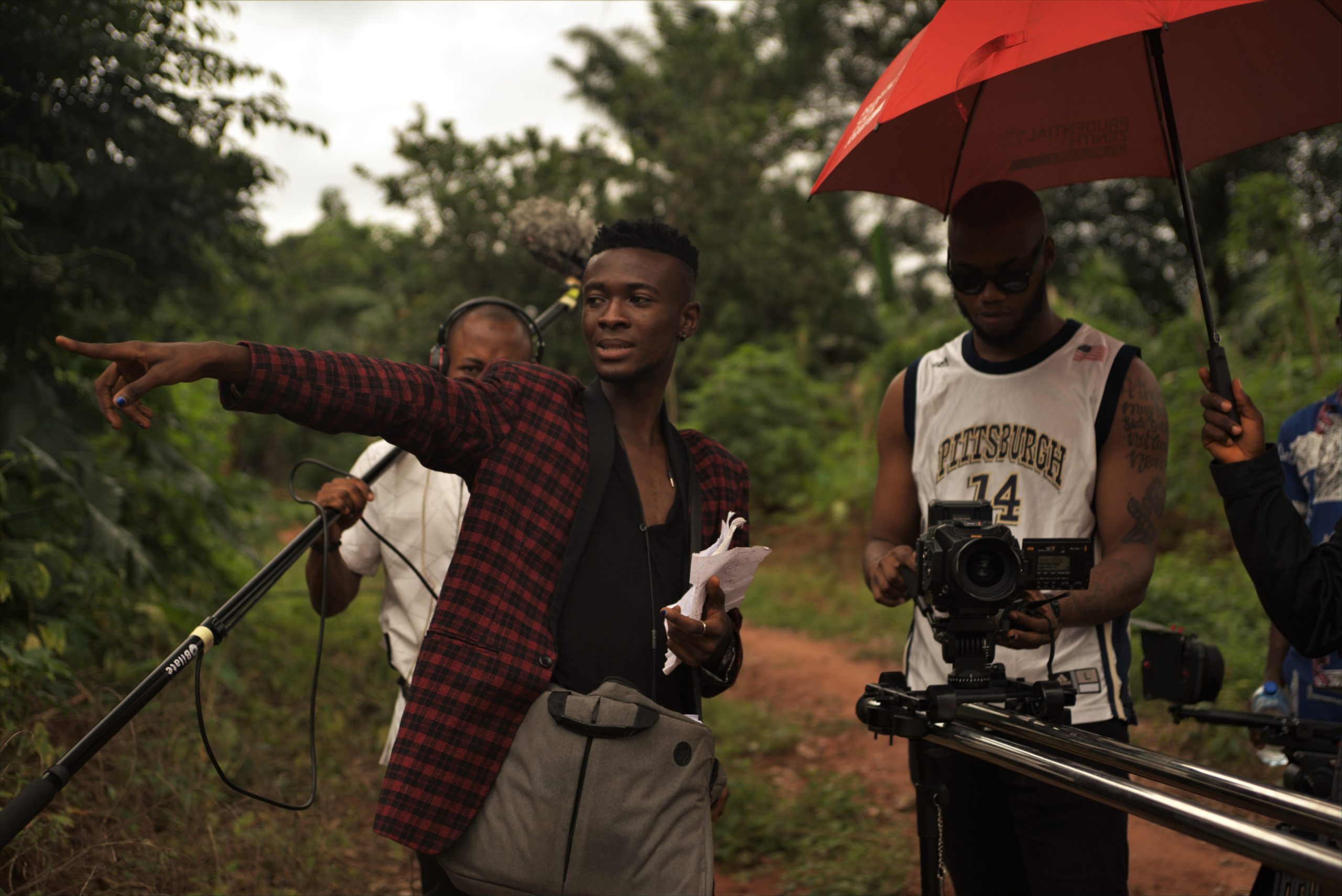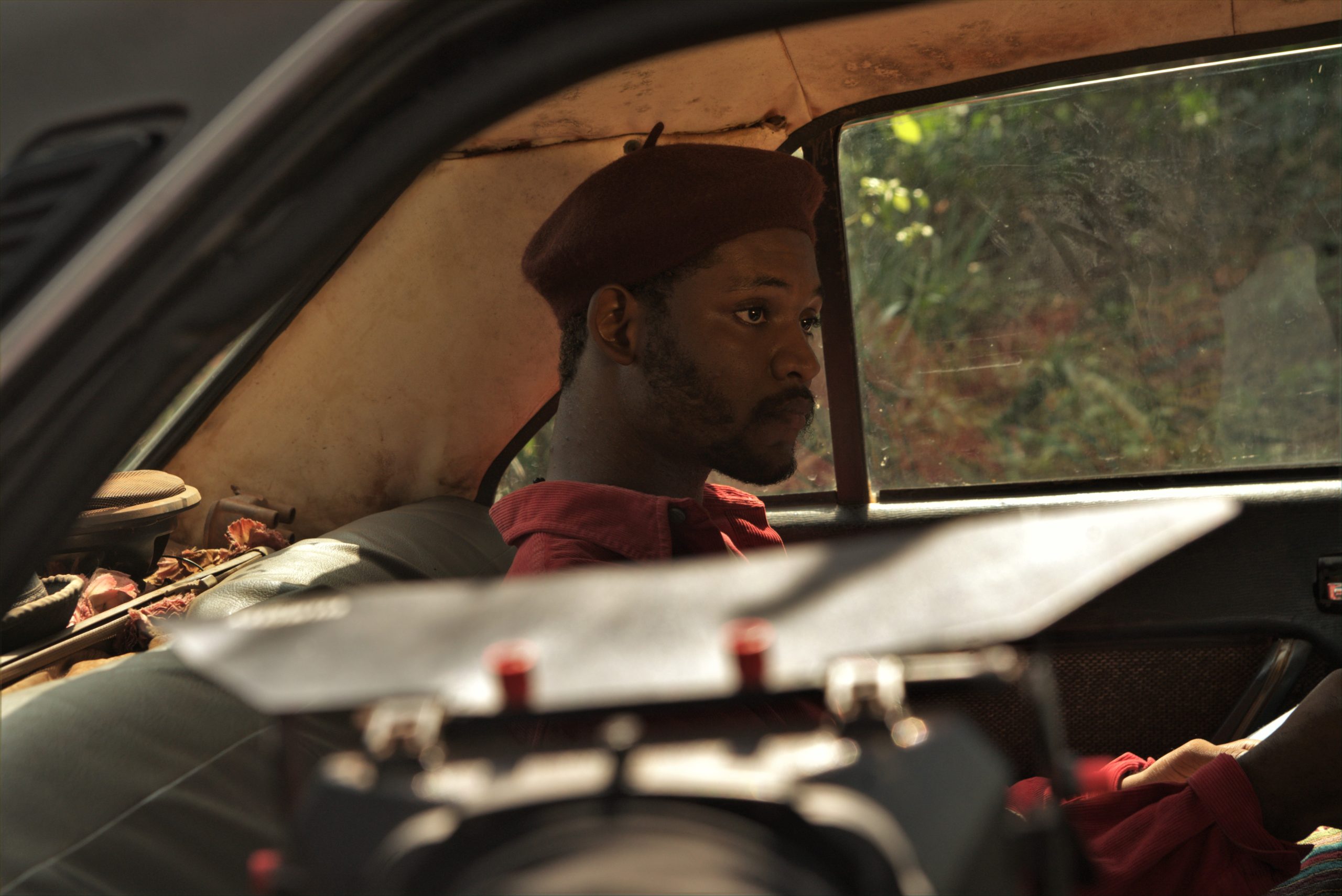This Nigerian film wants to change perceptions of queer femme men
- Femme gay men have noted experiencing discrimination even within the LGBTQ+ community and less holistic representation in media, a new short film Country Love features a femme lead character in Nigeria where queer people continue to face widespread homophobia.
Featured Image description: A still from the film Country Love with the two lead characters staring intently at each other. On the left is a femme man and the lead who is blonde, dressed in a flowery shirt and wearing a pearl necklace. Their nail is painted black and they have a colorful wristband. By him is a masculine presenting person who’s bare chested, has jet black hair, and is wearing a gold chain.
Ogun, Nigeria (Minority Africa) — While scouting for locations for their first film in Eastern Nigeria, Wapah Ezeigwe decided to not disclose that they were making a queer film.
“I basically went around lying about what I had to do,” they say. “I didn’t really feel bad about [it] because I felt I was doing a good thing.”
As a femme queer Nigerian person who is non-binary, Ezeigwe was frustrated by how femme characters were portrayed in films both in Nigeria and outside of the country. They felt a huge proportion of the films they watched featuring femme roles relied on femmephobic tropes but also that queer representation was dominated by “masculine queer” characters.
“The queer identity is very diverse,” 26-year-old Ezeigwe says. “It is kind of offensive when you try to streamline these identities and represent queerness as being masculine.”
It was no surprise then that when the filmmaker who is currently one of 20 film creatives chosen across West Africa to be part of the Multichoice Talent Factory, decided to make their directorial debut, it was a film with a femme queer man as the lead character.
“I felt we shouldn’t be pushed around being femme and that it was very important for people to understand our identity,” they say.
The short film Country Love is a story about acceptance and siblinghood. It looks at how sexuality, memory, and childhood love model the experiences of queer people in Nigeria.
“Our home, our family members, the feeling of love, I wanted to explore those things and how it concerns a queer individual,” says Ezeigwe who, besides being director, also wrote the film.

The idea for Country Love came to Ezeigwe from the title of a poem ‘Stay’ they found while reading The Muse, a literary journal from the University of Nigeria, Nsukka.
“The title brought this melancholic idea to me about someone that’s not at home with himself and wants to leave but is aware that leaving would cause a deep sense of sadness. I wanted to tell the story of someone struggling between staying and leaving,” Ezeigwe tells Minority Africa.
Country Love focuses on the relationship between two siblings, Kambili and Nneka. It touches on the concept of home as regards queer people , for many of who a home is a place where there is a clash of interests despite the love that exists therein.
The lead character Kambili returns home after fifteen years, more comfortable and confident in himself, but his queerness and his sister’s refusal to accept him – the reasons he left home – strains their relationship.
“She’s been longing for her brother to return, but as time goes by, they’re back to square one because now he’s more in tune with who he knows he is, and she just cannot understand and accept it,” says Uzoamaka Onuoha who plays Nneka in the film.
“But she loves her brother and can’t love that aspect of her brother. Yet from Kambili’s point of view, ‘You can’t accept me and accept only the part that is conducive for you.’” Onuoha adds.
A huge part of Nneka’s contention with her brother is his open expression of his feminine side. Focusing on this and writing Kambili as an unapologetic, vibrant and confident character mattered to Ezeigwe for various reasons.
“I’m very deliberate about how I portray femme [characters],” they say. “Most people expect the femme person to be weak. I feel seeing our identity from a place of power is very important.”

And why is femme representation crucial? Because femme men often end up being on the frontline of the queer movement, Ezeigwe says.
“Both consciously and unconsciously,” they explain. “Once you are femme and you are out there…even though you don’t identify as queer, people would always assume you are queer.”
It is an understanding that actor Kelechi Michaels who plays Kambili says the film made him realize as well.
“Working on it made me respect femme men more because it’s not easy having to live your life in a way that everyone looks at you in some kind of way,” he tells Minority Africa.
Michaels, 24, is not femme and he notes this as a reservation Ezeigwe had when he sent in his audition tape.
“[They were] like ‘Oh I am going to need you to be as femme as possible,’ and I was like yeah sure,” he says.
Although having worked on various projects within the Nigerian movie industry, Michaels admits Country Love was different from anything he had done requiring a lot more from him as an actor.
“I realized sometimes on set that after I finished a scene, I got really weak because of how demanding that particular scene was,” he says. “It was a lot of struggle but it kind of made me grow as an actor.”
The film was shot on location in Enugu State, Eastern Nigeria where Michaels notes he got a glimpse of what life was like for femme men in Nigeria.
“There were some times where when we [started] shooting, the villagers would gather around,“ he says. “I would always get this side talk and stares from them, like seeing a man act as a woman was kind of really strange for them.”

Although Nigeria is a deeply homophobic country, with the Same-Sex Marriage Prohibition Act disallowing marriage between persons of the same sex, there are no laws criminalising making films with gay characters.
Yet, films with queer characters are not usually aired on Nigerian television, with the National Film and Video Censors Board often criticising such movies and banning them. This doesn’t discourage filmmakers like Ezeigwe, who believes visibility is important and is one of the most powerful tools that can be used for queer liberation.
“Being aware that we’re in a struggle, we’re not liberated in this part of the world, so if you want to tell queer stories, you have to focus your mind that you want to bring out queer visibility,” they tell Minority Africa.
“You may not want to be so political with your film, you just want to tell stories, but because you’re in a very stifling society, you find yourself always at that place where your expressions are seen as political and challenging society’s stereotypes,” they add.
Country Love is currently being submitted to film festivals and is expected to be released for public viewing later in the year. Michaels, like much of the cast and crew, continues to be optimistic about what impact the film will have upon its release.
“I hope that every femme queer man out there would see this film and feel seen,” he says.
Samuel Banjoko is a Supporting Editor at Minority Africa. He is a Nigerian writer based in Ibadan, Nigeria who enjoys writing about art and culture.






